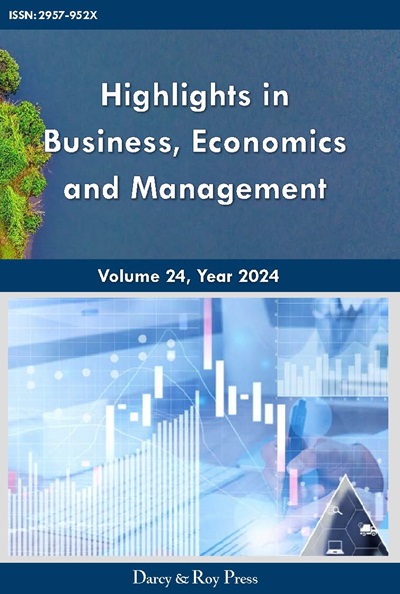Enhancing the Well-Being of Uber Drivers: Insights and Strategies from DiDi
DOI:
https://doi.org/10.54097/xgs6nc56Keywords:
Uber drivers; Ride-sharing platforms; Driver well-being; Income stability; Discrimination mitigationAbstract
The rise of the sharing economy, epitomized by Uber, has revolutionized work dynamics. Uber, with its allure of flexibility and accessibility, has empowered countless individuals to explore new avenues of employment. However, within this transformative landscape, unique challenges have taken root, particularly affecting those who rely on Uber as their primary source of income. With Uber's driver community now numbering over 5.4 million strong, the imperative to address these challenges has become increasingly pronounced. This study embarks on an exploration of innovative operational solutions, drawing inspiration from the practices of Didi, the ride-sharing juggernaut in China. It addresses income instability through fairer commissions and surge pricing incentives, combats isolation with community-building features, and tackles discrimination with enhanced driver rating systems through different tags. By embracing and implementing these multifaceted strategies, Uber has the potential to fortify its platform, fostering a mutually beneficial ecosystem that not only bolsters the company's growth but also enhances the livelihoods of its dedicated drivers.
Downloads
References
Uber Technologies, Inc. (2022). Uber Announces Results for Fourth Quarter and Full Year 2022. https://s23.q4cdn.com/407969754/files/doc_financials/2022/q4/Uber-Q4-22-Earnings-Press-Release.pdf
Minchin, T. J. (2020). Be Your Own Boss?: Long-Term Labor Trends and the Rise of Uber. Australasian Journal of American Studies, 39(1), 47–80. https://www.jstor.org/stable/26973000
Kaltner, J. (2018). Employment status of uber and lyft drivers: unsettlingly settled. Hastings Women's Law Journal, 29(1), 29-54.
DeBruyne, N. L. (2017). Uber drivers: disputed employment relationship in light of the sharing economy. Chicago-Kent Law Review, 92(1), 289-316
Geitung, I. (2017). Uber drivers in Cape Town: Working conditions and worker agency in the sharing economy (Master's thesis).
Jenkins, G. T., Janich, N., Wu, S., & Shafer, M. (2023). Social isolation and mental health: Evidence from adults with serious mental illness. Psychiatric rehabilitation journal, 46(2), 148.
Rosenblat, A., Levy, K.E.C., Barocas, S. and Hwang, T. (2017), Discriminating Tastes: Uber's Customer Ratings as Vehicles for Workplace Discrimination. Policy & Internet, 9: 256-279. https://doi.org/10.1002/poi3.153
Chan, N. K., & Kwok, C. (2022). The politics of platform power in surveillance capitalism: A comparative case study of ride-hailing platforms in China and the United States. Global Media and China, 7(2), 131–150. https://doi.org/10.1177/20594364211046769
Huimei, W., & Yadi, L. (2019). Comparative Analysis of DiDi and Uber App. In Frontier Computing: Theory, Technologies and Applications (FC 2018) 7 (pp. 1286-1291). Springer Singapore.
Lyu, H. (2023). Ride-hailing platforms cut commission rate, industry norms approaching. China Economic Times, 1. (in Chinese).
Moon, Y. (2015). Uber: Changing the Way the World Moves. Harvard Business School Case, 316-101.
Wells, K. J., Attoh, K., & Cullen, D. (2021). “Just-in-Place” labor: Driver organizing in the Uber workplace. Environment and Planning A: Economy and Space, 53(2), 315–331. https://doi.org/10.1177/0308518X20949266
Li, J. (2020). Research and Practice on Experience Design of the Growth Center Board for DiDi Drivers. Hunan University, MA Thesis. https://kns.cnki.net/KCMS/detail/detail.aspx?dbname=CMFD202102&filename=1020406196.nh. (in Chinese).
Chongqing Group Building|DiDi "Chuan Potential Together" Theme Group Building Activity Highlight Gallery. (2020). Sohu. https://www.sohu.com/na/428130522_100278929. (in Chinese).
Yao, J. (2019). The Influence of Motivating Factors of Online Car-hailing Drivers. Capital University of Economics and Business, MA Thesis. (in Chinese)
Downloads
Published
Issue
Section
License

This work is licensed under a Creative Commons Attribution-NonCommercial 4.0 International License.

















